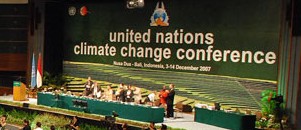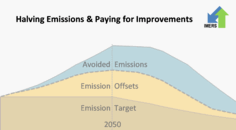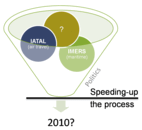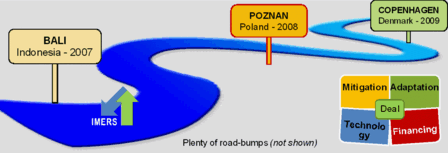@ Bali: IMERS & IATAL - Emissions and Adaptation Financing
We held an official side event at the UNFCCC COP 13


meeting in Bali on:
- Bunker Fuel Emissions and Adaptation Funding
The presentation from the event is available for download

- Two main proposals were discussed in details:
- IATAL
 (0.7 MB), an International Air Travel Adaptation Levy
(0.7 MB), an International Air Travel Adaptation Levy
- IMERS
 (0.1 MB), see the special 2-page IMERS synopsis prepared for Bali
(0.1 MB), see the special 2-page IMERS synopsis prepared for Bali
- The goal was twofold:
- Increasing momentum and furthering our scheme for international maritime emissions
- Simultaneously reducing the gap in financing for adaptation
- The event has been recognized and reported by the Earth Negotiations Bulletin. The reports from the selected events held on 05 Dec are available:
- web version with additional pictures
- shorter pdf version
 (1 MB)
(1 MB)
Extra Events & News
Monday, 10 Dec
A site event was held by Norway on:
International GHG emissions from aviation and maritime transport - follow up of the seminar in Oslo 4-5 October 07. Official workshop conclusions are available ![]() (0.1 MB; SBSTA/2007/MISC.29).
(0.1 MB; SBSTA/2007/MISC.29).
Presentations were given by:
- André Jol, European Environment Agency, Conclusions from the Oslo Workshop
 (0.1 MB)
(0.1 MB)
- Miguel Palomares, IMO (no presentation; Mr M. Palomares stressed the importance of international shipping to the global economy. He also outlined the current IMO GHG activities, including a correspondence group to consider technical, operational and market-based approaches to reducing GHG emissions.)
- Marit Viktoria Pettersen, Ministry of Environment, Norway, Norwegian GHG proposal to IMO
 (0.2MB)
(0.2MB)
- Jakob Graichen, Öko-Institut, Germany, Options on aviation post-2012
 (0.3MB)
(0.3MB)
- Stefan Seum, Stefan Seum Consulting, Options on shipping post-2012
 (0.2 MB)
(0.2 MB)
A short report from the event is available at the IISD RS Blog.
Saturday, 08 Dec
Tuvalu has submitted an International Blueprint on Adaptation ![]() (0.2 MB) to COP 13. A novel Burden Sharing Mechanism is proposed comprising a levy on international airfares and maritime transport freight charges. Something very close to IMERS. The main differences is that it does not include emission reductions. Additionally, the raised funds will be significantly lower based on the quoted 0.01% base levy. Not the best starting point perhaps to reach a rapid consensus on innovative means to raise the significant funds needed to reduce the gap in financing for adaptation ....(our humble view).
(0.2 MB) to COP 13. A novel Burden Sharing Mechanism is proposed comprising a levy on international airfares and maritime transport freight charges. Something very close to IMERS. The main differences is that it does not include emission reductions. Additionally, the raised funds will be significantly lower based on the quoted 0.01% base levy. Not the best starting point perhaps to reach a rapid consensus on innovative means to raise the significant funds needed to reduce the gap in financing for adaptation ....(our humble view).
Friday, 07 Dec
- We presented IMERS as the only concrete proposal for the post-2012 regime for international maritime transport at a side event organized by the International Emissions Trading Association, IETA entitled:
- What is the scope for including international marine transport in the post-2012 regime?
- on Friday, 07 Sept.
- Presentation is enclosed
 (0.2MB).
(0.2MB).
However, an approach to agree underlying climate change principles for such a scheme is needed within the UNFCCC/SBSTA/SBI. The current process is unlikely to deliver it.
Due to this problem IMO is unlikely to be able to decide on any global scheme until the principle of "Common but differentiated responsibilities" is clearly addressed.
A facilitated 1-year approach using IMERS as a strawman to jointly shape a solution and build the required trust around concrete details could break the deadlock. This is now being actively pursued by us based on discussions with very senior officials.
Bali Outcomes & Impressions
At the UNFCCC COP 13 a Bali Action Plan ![]() (0.1 MB) has been agreed that launches inclusive negotiations on post-2012 with an end date of 2009. IMERS would deliver on the four pillars of the Bali Roadmap/Deal.
(0.1 MB) has been agreed that launches inclusive negotiations on post-2012 with an end date of 2009. IMERS would deliver on the four pillars of the Bali Roadmap/Deal.

For impressions and suggestions from Bali jump to On the Road again!
- The talks will address, inter alia,
- Long-term goal for global greenhouse gas emissions reductions
- Enhanced action on mitigation, adaptation, technology development and transfer, and finance and investment
Reducing the gap in financing for adaptation
We were very pleased with the very positive feedback on our IMERS proposal in Bali. When implemented, it will deliver the four major blocks of the Bali roadmap for international shipping. We are actively pursuing buy-in activities.
On the road again! - Impressions from COP 13 UNFCCC
Short extracts from a full paper- The aim of the recent UN climate change conference in Nusa Dua (Bali, Indonesia) was widely held to be two-fold.
- To finalise the operational details of the Kyoto Protocol Adaptation Fund (AF), and
- to put together a ‘Road Map’ for negotiations on strengthening the UN climate change regime beyond the initial commitments of the Kyoto Protocol which expire in 2012.
The Adaptation Fund
[...] The key to the astonishingly smooth progress and the early breakthrough in the negotiations on the AF was no doubt the absence of surprises and a raised level of trust [...] This was in stark contrast to the other key negotiations strand on the Bali Road Map which, particularly in the final phase, turned out to have a number of very unfortunate surprises with a concomitant loss of trust.
The Bali Roadmap: The many plots of the Ides of December
Of Contact and Small Groups
[...] The one issue that eluded consensus in the small ministerial group was the relevant paragraph (1.b.ii) on the scope of developing country mitigation activities to be considered in the proposed Convention-track negotiations. [...]
The multi-plot plenary
[...] At this point the drama started to unfold. Seven seconds after the EU intervention [...]
The unfortunate events of the final morning have turned this into a rather inauspicious beginning, as far as trust building is concerned. [...]
An American "U-turn"?
When the plenary convened for the third time [...]
But to think that the US was swayed by this, or indeed by the jeering after their initial intervention, is simply naïve.
The Way Forward: To Ensure a Safe Journey
[...] As to the medium term, the difficulty will be to find tools to ‘square the global mitigation circle,’ that is to break out of the “we-will-only-take-on-commitments-if-they-do” stalemate which has bedevilled the climate change process ever since the passing of the notorious Byrd-Hagel resolution in the US Senate in 1997 [...] No one ‘in the know’ will underestimate the difficulty of this task. But it is not impossible.
[...] Measurable, reportable and verifiable developing country mitigation commitments will, if at all, only be possible as a package deal with measurable, reportable and verifiable commitments to provide technology, financing and capacity-building by developed countries. Indeed India’s closing statement can and should be read in this spirit:
“The road to Bali was in principle strong, the road from Bali must be much stronger.
We need to move forward to Poland to Denmark, and beyond, for what is at stake is saving our future generations. And therefore it is not a question of what you will commit or what I will commit.
It is a question of what we will commit together to meet that challenge!”
-------
The above excerpts do NOT do justice to the 7 page paper. Read it ALL by following the link ![]() (0.1 MB).
(0.1 MB).
On the road already - to Poznan (Poland, COP 14, 2008) and to Copenhagen (Denmark, COP 15, 2009).
With several multilateral "stops" in London at IMO for IMERS!